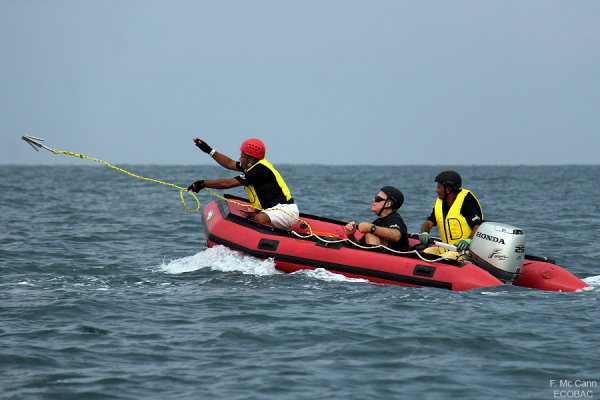Expanding and evolving: the Global Entanglement Response Network
It’s three years since the IWC held its first entanglement response training workshop. More than 250 individuals from over 20 countries have been trained by the programme, which aims to share the capabilities already built by countries like Australia, South Africa, the US and Canada, with other regions facing entanglement threats. The recent training in Mexico shows the extent to which capacity has been built in some countries, where the emphasis is now moving from safe and professional response to advanced techniques and longer term considerations of data analysis and prevention.
The Government of Mexico (Comision Nacional de Areas Naturales Protegidas) has collaborated closely with the IWC, and provided funding to build a professional response team called RABEN (Red de Asistencia a Ballenas Enmalladas). RABEN is now operating along Mexico's extensive coastline. The country hosts a number of whale populations and is the primary breeding ground for North Pacific humpback and gray whales. Six entanglement response training events have been held in Mexico. The latest, in Puerto Vallarta in November, was a ‘prototype’ advanced workshop.
Aimed mainly at individuals who have attended one of the previous training events, the advanced syllabus began in the classroom. Real entanglement situations handled by the attendees were reviewed to learn from both the successes and the challenges. Every entanglement response involves a powerful and distressed wild animal in ocean waters. Two particularly difficult cases were raised during the training which demonstrate how complex and dangerous a response scenario can be. Other whales were present and agitated in one example. In the other, all entanglement lines were tightly bound around the body of the whale with nothing trailing and therefore no lines easily accessible.
Similar scenarios were then played out on the water, with one boat acting as ‘whale’ whilst the other played the role of rescue vessel. Unlike in earlier training, the ‘whale’ boats simulated a whale’s sudden changes of speed and direction, and time limits were set for responders to act before a real whale would dive. Responders also practised cutting free lines of entanglement on submerged, moving objects.
Equally important to this advanced training was an increased focus on the long term goal of preventing entanglements occurring in the first place. The workshop looked at documentation and the need to compile consistent, quality data on the nature of each entanglement, the precise location, and the species involved. This information will feed into a new IWC database for analysis which in turn will help develop methods of mitigation. Long term, this is the only solution to the problem of entanglement.
Illustrating the importance of this programme, the Puerta Vallarta response team faced a very challenging entanglement just a few weeks after the workshop. A humpback calf was sighted swimming alongside its mother, with a fine mesh net and nylon line stretched tight from its mouth and across both sides of its body. After several days, conditions were considered suitable for the entanglement response team to engage. Patience and steady nerves were required to extract the net and cut lines without frightening the calf or provoking its mother. The delicate operation lasted 3.5 hours and resulted in a successful disentanglement.
It was recently estimated that 300,000 marine mammal deaths are caused by entanglement every year. No coastline in the world is exempt and, until such time as preventative measures can be relied upon, entanglement response teams like RABEN in Mexico will play a vital role. The IWC global entanglement response network aims to replicate the capability that now exists in Mexico, and equip countries all over the world with the skills to respond safely and effectively to entanglements. The IWC could not provide this training without the support of national governments, NGOs and IGOs, including the loan of leading entanglement responders to lead the training workshops from NOAA (the National Oceanographic and Atmospheric Administration) and CCS (Centre for Coastal Studies, Provincetown).
For more information on entanglement and the IWC Global Entanglement Response Network, click here.
For more information on Mexico´s Whale Entanglement Network visit www.rabenmexico.org

